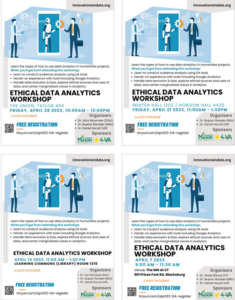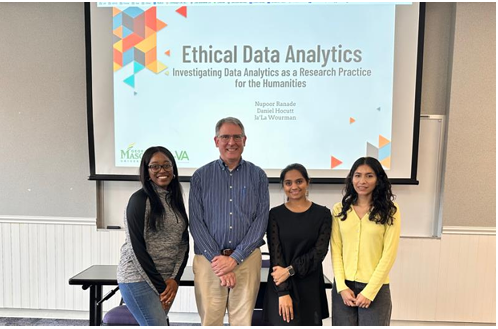While data analysis is critical to any research, it is important that users are acutely aware of what is behind the data — including the moral obligations regarding the gathering and protection of the data. It is recognized that researchers should be informed about ethical sources and uses of data and understand both the potentially marginalized voices and the audiences within the dataset. Faculty at four 4-VA partner schools (VT, ODU, JMU and Mason) coalesced around the need to raise awareness about the opportunities and limitations in data analytics as an area of research and practice for the field of humanities. Moreover, they were interested in building a methodological framework for humanities instructors.
As the team saw it, the need for critical data literacy should not be limited to data scientists or engineers. Communicators, designers, developers, artists, historians, and more are asked to make sense of increasingly complex data sets. They were interested in developing practice-oriented pedagogical resources to enable instructors to support students as they seek jobs and internship opportunities throughout the state. In this way, they could add diverse voices to the technology sector and Women in Tech opportunities, especially for students who are not able to afford an engineering degree.
While data analysis is critical to any research, it is important that users are acutely aware of what is behind the data — including the moral obligations regarding the gathering and protection of the data. It is recognized that researchers should be informed about ethical sources and uses of data and understand both the potentially marginalized voices and the audiences within the dataset. Faculty at four 4-VA partner schools (VT, ODU, JMU and Mason) coalesced around the need to raise awareness about the opportunities and limitations in data analytics as an area of research and practice for the field of humanities. Moreover, they were interested in building a methodological framework for humanities instructors.
As the team saw it, the need for critical data literacy should not be limited to data scientists or engineers. Communicators, designers, developers, artists, historians, and more are asked to make sense of increasingly complex data sets. They were interested in developing practice-oriented pedagogical resources to enable instructors to support students as they seek jobs and internship opportunities throughout the state. In this way, they could add diverse voices to the technology sector and Women in Tech opportunities, especially for students who are not able to afford an engineering degree.

The project was led by Mason’s Nupoor Ranade, Assistant Professor in the Department of English. Ranade was joined by ODU’s Daniel Richards, Associate Professor, Department of English; JMU’s Ja’La Wourman Assistant Professor, School of Writing, Rhetoric & Technical Communication: and VT’s Sweta Baniya, Assistant Professor, Department of English.
Armed with a 4-VA grant, the group set to work on the planning and execution of a one-day workshop for delivery at each of the four campuses. Targeted attendees included tenure-track and non-tenure track faculty, post-doctoral scholars, graduate teaching and research assistants and graduate students. The co-PIs acted as organizers at their respective institutions and were present for the workshops.
The workshops were delivered during April 2023 and were very well received, garnering many positive results. Attendees left the workshops with specifically designed training materials including PowerPoint presentations and handouts.

The team’s next objective was to disseminate the workshop resources and results to the broader community, which came to fruition through their website https://www.innovationsindata.org/.
They then presented part of their findings at the International Society of Technical Communication’s Summit in Atlanta in May 2023, which resulted in numerous messages from industry practitioners interested in collaborating on further opportunities to add to the research. They have also shared the workshop summary and workshop outcomes at the Association of Computing Machinery Special Interest Group on Design of Communication October conference in Orlando, Fla.
“This grant gave Daniel, Ja’La, Sweta and I an opportunity to develop and share concrete pedagogical resources with Virginia faculty (and beyond) that will enable humanities researchers and students incorporate data analytics studies in human-centered audience analysis,” concludes Ranade. “It looks like this is just the beginning!”

